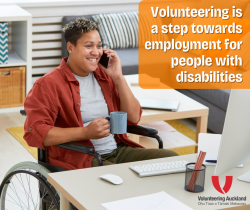Volunteering can open doors to employment for disabled people

Volunteering can open doors. For disabled people — including those with physical, intellectual, neurodiverse conditions, or long-term injuries or illnesses — it can be an empowering pathway to meaningful inclusion, skill development, and ultimately, employment. While barriers to paid work remain all too common, volunteering provides a way to gain experience, build confidence, showcase ability, and contribute to a cause that matters.
Across Aotearoa New Zealand, organisations are recognising the role volunteering can play in advancing equity and access. When done well, a volunteer programme can provide a welcoming space for disabled people to explore new opportunities, build their networks, and grow their sense of purpose — all while making a real difference in their community.
Why Volunteering?
For many disabled people, the transition into paid employment is not straightforward. Discrimination, inaccessible workplaces, assumptions about capacity, and lack of flexible roles can stand in the way. Volunteering can offer a low-pressure environment to try things out, develop workplace behaviours and routines, and gain hands-on experience in a supportive setting.
Benefits of volunteering as a pathway to employment include:
- Skill development: Whether it’s communication, teamwork, time management or task-specific skills, volunteering helps build real-world competencies that translate to paid work.
- CV-building experience: Volunteer roles demonstrate initiative, reliability, and community connection — traits employers value highly.
- Confidence and self-belief: Contributing to a team, being appreciated, and seeing the impact of your work can boost self-esteem and motivation.
- Workplace familiarity: Volunteering can help someone get used to routines, expectations, and different kinds of workplace settings.
- Social connection: Isolation is a challenge many disabled people face. Volunteering helps build friendships, networks, and a sense of belonging.
- Try-before-you-apply: Volunteering in different roles helps clarify what kind of work someone enjoys and where their strengths lie.
What to Look for in a Volunteer Programme
Not every volunteer role will suit every person — and that’s okay. The key is finding an organisation and role that is a good match for individual interests, needs, and goals. Here are some things disabled people (and their whānau or support people) can look for:
- Welcoming culture: Does the organisation show genuine openness to diversity? Are staff and volunteers respectful, inclusive, and encouraging?
- Willingness to adapt: Is the organisation flexible with how, when, and where volunteering happens? Are they open to tailoring a role or environment to suit your access needs?
- Clear expectations and support: Is there a volunteer coordinator or team member who can provide guidance, explain the tasks clearly, and check in regularly?
- Opportunity to grow: Can the role develop over time or lead to other opportunities within the organisation?
- Accessibility: Are the physical spaces, communication methods, and digital tools accessible for you?
- Support person inclusion: If needed, can a support worker or friend assist you as part of the role?
It’s also okay to ask about previous experience — has the organisation welcomed disabled volunteers before? How do they respond to feedback? A conversation with the volunteer coordinator is a good place to start.
Benefits for Organisations
Involving disabled people as volunteers isn’t about charity — it’s about inclusion, equity, and unlocking talent. When organisations create space for disabled volunteers, they benefit in meaningful ways:
- Stronger communities: Inclusion sends a message — everyone has value, and everyone belongs. That strengthens social cohesion and public trust.
- New perspectives: Disabled volunteers bring diverse lived experience that can improve service design, accessibility, and cultural competency.
- Deeper empathy and innovation: Working alongside disabled volunteers can challenge assumptions and spark creative solutions across teams.
- Staff and volunteer development: Inclusive volunteering environments help everyone grow — in patience, communication skills, and awareness.
- Mission alignment: If an organisation’s mission involves justice, wellbeing, health, or equity, involving disabled volunteers helps them walk the talk.
Importantly, organisations that provide meaningful, flexible volunteering opportunities may also become known as great places to work — attracting both volunteers and paid staff who value inclusive practice.
Volunteering Can Lead to Paid Work
While volunteering isn’t a job, it can be a bridge to one. Some disabled volunteers move into paid work with the same organisation they started with as a volunteer. Others use the experience, references, and confidence they gained to apply for jobs elsewhere. Sometimes, the act of showing up and succeeding as a volunteer shifts mindsets — not only for the person themselves, but for employers and communities who see their strengths in action.
Programmes that pair volunteering with employment coaching or job readiness support can help this transition even more. Disability support agencies, employment services, and volunteer centres can assist with matching people to the right roles and ensuring a strong support network is in place.
Final Thoughts
Volunteering isn’t just about giving back — it’s about being included, stepping forward, and showing what’s possible. For disabled people, volunteering can be a powerful, practical step towards paid employment and wider community participation. For organisations, embracing disabled volunteers is an opportunity to be part of a more equitable and dynamic future.
We all benefit when everyone has the chance to contribute. So let’s create spaces where people of all abilities can find purpose, build skills, and shine — as volunteers, as workers, and as valued members of our communities.

